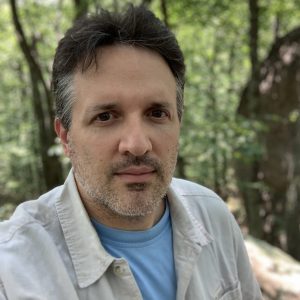In the middle of Shenandoah County, in the heart of the Shenandoah Valley, on the western banks of the Shenandoah River, is the town of Woodstock. With main thoroughfares like Water Street and Spring Street, an amateur baseball team called the River Bandits, and Seven Bends State Park on the outskirts, water is a defining characteristic of the community. And as the county seat for one of the top agricultural counties in Virginia, so is farming.
Both of these characteristics are on full display at Pleasantdale Farm, a couple of miles west of town, just beyond Interstate 81 and scattered subdivisions. Spring Hollow Run, a tributary to the Shenandoah River that passes through town, originates there. So did Wade Hawkins, whose grandfather bought the place in 1940, and who now runs the farm with his wife and three kids.
Growing up, Hawkins watched neighboring farms be developed throughout the 1990s. His father and grandfather tried to purchase and save some of them, but couldn’t compete with developers.
When Wade took over the farming operations, he wanted to prevent a similar fate for Pleasantdale. “It has taken years for my grandfather to build these soils up,” he says. “I just felt it was our obligation as farmers—as stewards of the land—to protect it.”
He started by working with the local and state agencies to implement best management practices such as fencing off springs, rotating crops and grazing, planting cover crops, building manure containment facilities, and creating a nutrient management plan. “The land is taking care of us, and we’re going to take care of the land,” he explains. “We’ll be the first ones affected if we do something wrong with the land, so we’re doing everything we can to protect our livelihood.”
One year, Hawkins read a magazine article about conservation easements as tools for protecting farms. He liked the idea of permanent protection. Running a start-to-finish cattle operation is expensive, he says, and like most farmers his family had many financial obligations. “If the cattle market busted and we couldn’t make payments, I didn’t want to see the bank come in and sell it, and then all of our hard work would be divided up. We knew that if we put it into easement, at least what we’ve done is going to stay there and somebody else can continue to thrive on our land.”
Working with the Virginia Outdoors Foundation, Natural Resources Conservation Service, and the Shenandoah County Easement Authority, Hawkins placed 308 acres under easement in 2014. The payments and tax benefits he received have helped the family improve their financial footing, and the community has gained the protection of a property that not only protects the farming landscape, but also the headwaters of a key water resource.
For Hawkins, the easement is also about allowing his family to continue what his grandfather started.
“When we feed the animals in the big barn, the kids have their tricycles and little dump trunks and bulldozers in there pushing the feed up to the cows with us,” he says. “It’s the life I grew up with, and I want them to have that, as well.”
